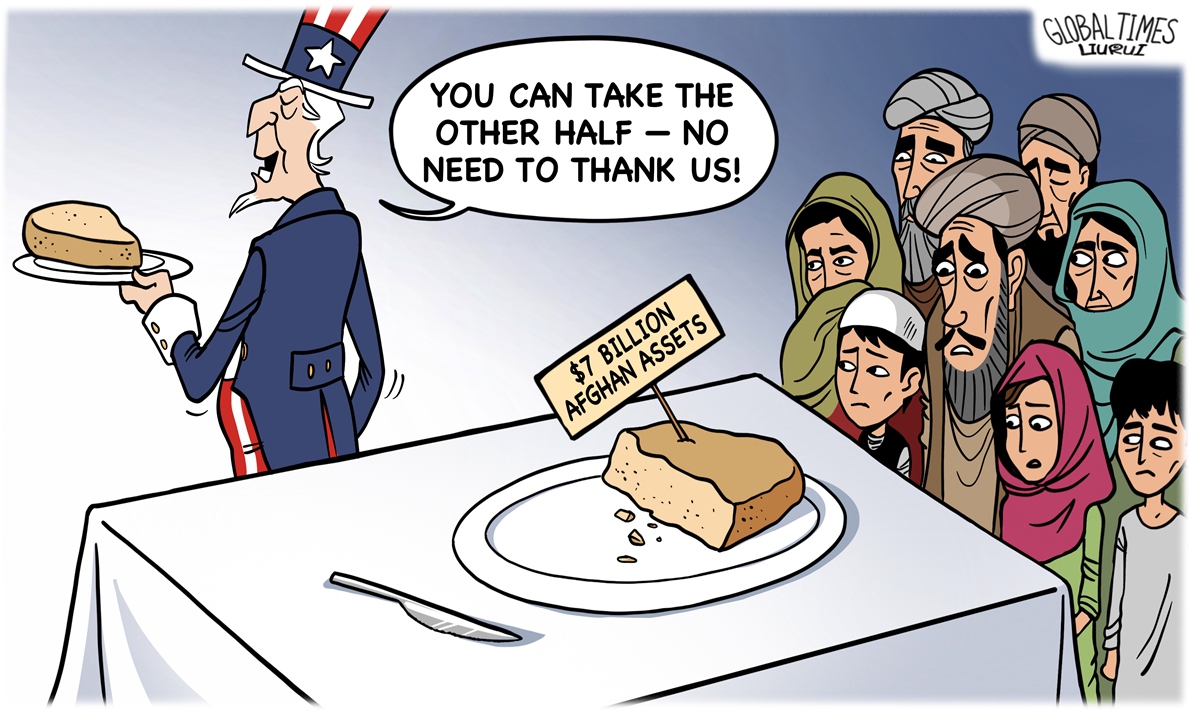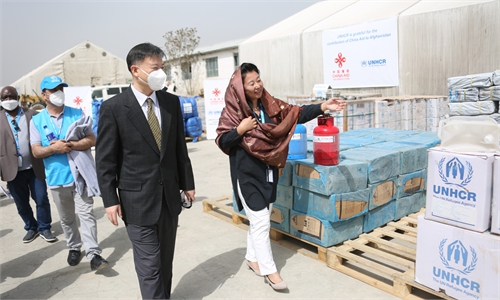‘Neighboring countries’ solution’ helps more than just Afghans: Global Times editorial

Afghanistan Illustration: Liu Rui/GT
The third Foreign Ministers' Meeting among the Neighboring Countries of Afghanistan is hosted by China in Tunxi, east China's Anhui Province, on Wednesday and Thursday. Foreign Ministers or representatives of Pakistan, Iran, Russia, Tajikistan, Turkmenistan and Uzbekistan are attending the meeting. At the same time, the "neighboring countries of Afghanistan Plus Afghanistan" foreign ministers' dialogue, as well as a meeting of the "China-US-Russia+" consultation mechanism on the Afghan issue will also be held. The latter two meetings are new compared with the previous foreign ministers' meetings.
The first meeting of foreign ministers of the neighboring countries of Afghanistan was held last September, which formally kickstarted the coordination and cooperation mechanism among Afghanistan's neighboring countries. At that time, the US and its allies made a hasty withdrawal from Afghanistan. The Afghan Taliban came to power again. The country confronted multiple challenges including humanitarian, people's livelihood and COVID-19 crisis. Faced with such a situation, Afghanistan's neighboring countries established a political consensus to jointly deal with the changing situation in Afghanistan, and believe that neighboring countries should play a unique role in addressing their own legitimate concerns and providing a favorable external environment for Afghanistan's stability and reconstruction. This mechanism played an important role in the critical window period for Afghanistan to end the chaos and resume governance, which can be called a pioneering approach.
The China-hosted meeting of the foreign ministers of Afghanistan's neighboring countries is taking neighboring countries' solutions on the Afghan issue to the next level. On the one hand, it insists on exerting a positive influence on the situation's development on the basis of respecting the sovereign independence and territorial integrity of Afghanistan. On the other hand, it adheres to resorting to dialogue and consultations to resolve differences, in an attempt to build consensus to the greatest extent possible. The US, as the party that shoulders the main responsibility for the Afghanistan issue, also participated in relevant consultations during the meetings. It shows the diplomatic efforts China has made as the host, as well as the effectiveness of the mechanism.
This international meeting focused on Afghanistan is important and timely. After the outbreak of the Ukrainian crisis, the US and the West politicized the refugee issue and attempted to place Russia in a position of injustice by claiming to admit a large number of Ukrainian refugees. Some divide refugees into different classes, as if Ukrainian refugees deserve sympathy, while refugees from Afghanistan, the Middle East and other countries do not .
This unbalanced focus and double standard make fundraising for Afghanistan even more difficult. With over 24 million people in Afghanistan in need of humanitarian assistance this year, the UN's appeal for $4.44 billion to fund the humanitarian response plan is making little progress. UN High Commissioner for Refugees Filippo Grandi had to say that the situations in Afghanistan also require political attention and resources should not be forgotten or neglected as the world's attention is focused on the conflict in Ukraine.
The humanitarian crisis in Afghanistan is a visual reminder to the world in an overwhelmingly painful way that creating confrontation and imposing sanctions indiscriminately never solve the problem. Some predictions suggest that if Washington does not lift economic sanctions on Afghanistan, more people will die in the future from the effects of sanctions than have died in the war in the 20-year war.
Chinese State Councilor and Foreign Minister Wang Yi sent a clear signal on Monday that the Afghan issue remains important in the current international peace and security agenda. The world should not forget about Afghanistan, and the US, as the culprit of the Afghan problem, should not deliberately ignore and avoid the country. Of course, we can't expect too much from the US, a country that has divided $7 billion of life-saving money which belongs to the Afghan people in the face of an "avalanche of hunger and poverty." But it must be pointed out that it has a greater responsibility to alleviate the humanitarian crisis in Afghanistan and to participate in the reconstruction activities in this country.
The Chinese philosopher Guan Zi once said, "the world will not be chaotic forever, nor will it be forever stable. There is chaos when evil is in power, and stability when the power is good. When governance reaches perfection, situations can be controlled accordingly." The 20-year war launched by the US has messed up Afghanistan, while the "Neighboring countries' solution" which promotes stability of Afghanistan and supports the Afghan people has offered a new way of thinking for this turbulent world. It's not only of practical significance to Afghanistan, but is also worthy of reference to the international community.

